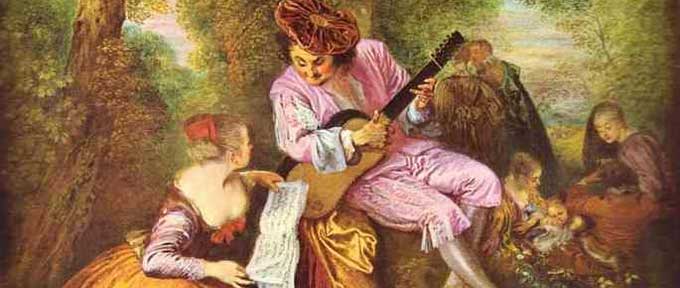Preparing for and recording a new disc of French Renaissance and Baroque music for guitar and lute during valentine’s week has inadvertently turned my thoughts to the unavoidable connection between this music and romantic love.
It’s very easy for us to conjur up the somewhat cliched image of the stricken lover, woefully plucking his lute to some melancholy air beneath the window of his coy or cruel mistress, or as it is beautifully rendered in Shakespeare’s ‘As you like it’, ‘Is it not strange that sheep’s guts could hail souls out of men’s bodies?’ There is however a good deal of truth in the image of the lute or guitar being an essential weapon in the war of seduction. In many of Watteau’s paintings guitars in particular are often put in this context, ‘La gamme d’amour (the scale of love) being an excellent example, where the sensual intentions of the gracefully strumming gallant seem entirely obvious to the onlooker. Indeed, the appearence of the 5 course guitar in Spain towards the end of the 16th century did in fact engender a sense of outrage in those of a conservative musical or moral disposition who feared that this easily played and strummed instrument (‘There is not a stable boy who is not a musician on the guitar’) would bring about a moral decline very similar to the fears expressed when rock and roll first appeared in the 1950s. Certainly the guitar enjoyed a reputation of louche sensuality ‘It has a certain something that is feminine and pleasing to women, flattering their hearts and making them inclined to voluptiousness’. Perhaps it was the absence of a full bass register on this new instrument which associated it with all things feminine and contrasted it with the nobler lute and its ever expanding bass range.
Thankfully the guitar’s reputation was given a boost by two of its most famous exponents Louis XIV in France and Charles II in Restoration England. One musician, the Italian guitarist/composer Francesco Corbetta (1615-81) in particular flanks these two monarchs having been an important figure at both courts. Corbetta was initially brought to Versailles to be Louis’ guitar tutor and was very likely part of the entourage which accompanied the triumphant Charles on his return to England’s throne in 1660. Corbetta even dedicated a book of music (both called ‘La guitarre royalle’) to each king. The guitar enjoyed a great period of vogue in restoration England and was extemelly popular among young ladies of rank ‘Francesco had composed a sarabande, which either charmed or infatuated every person; for the whole guitarery at court were trying at it; and god knows what a universal strumming there was’. Corbetta’s music also finds itself at the centre of a sexual intrigue where the Duke of York, supposedly desirous to play the aforementioned sarabande uses it as an excuse to visit the chambers of the Lady Chesterfield who was apparently the owner of the ‘best guitar in England’. Her husband however realised what was going on, ‘Jealousy, like a malignant vapour now seized upon his brain: a thousand suspicions, blacker than ink took possesion of his imagination and were continually increasing; for while the brother played upon the guitar to the duke the sister ogled and accompanied him with her eyes as if the coast had been clear and no enemy to observe them.’
If contemporary reports about the guitar are to be believed, then it does seem to be the perfect instrument for both of these typically baroque monarchs with their endless streams of mistresses, love of spectacle, dancing, theatre and general merrymaking. Indeed the guitar does seem to symbolise the absolute epitome of everything that would have seemed abhorant to Cromwell and his puritanical cohorts and for this reason alone, without even considering its rich and beautiful repertoire, it should be celebrated.
‘La Royalle’ featuring music by Corbetta dedicated to Charles II, alongside guitar and theorbo music by De Visee and music for renaissance guitar and lute by Attaignant, Le Roy, Morlaye and Brayssing will be released by Delphian records (DCD 111) later this year.
Gordon J S Ferries Feb 2012 – www.gordonferries.com
Gordon is one of the UK’s foremost exponent of the baroque guitar.
